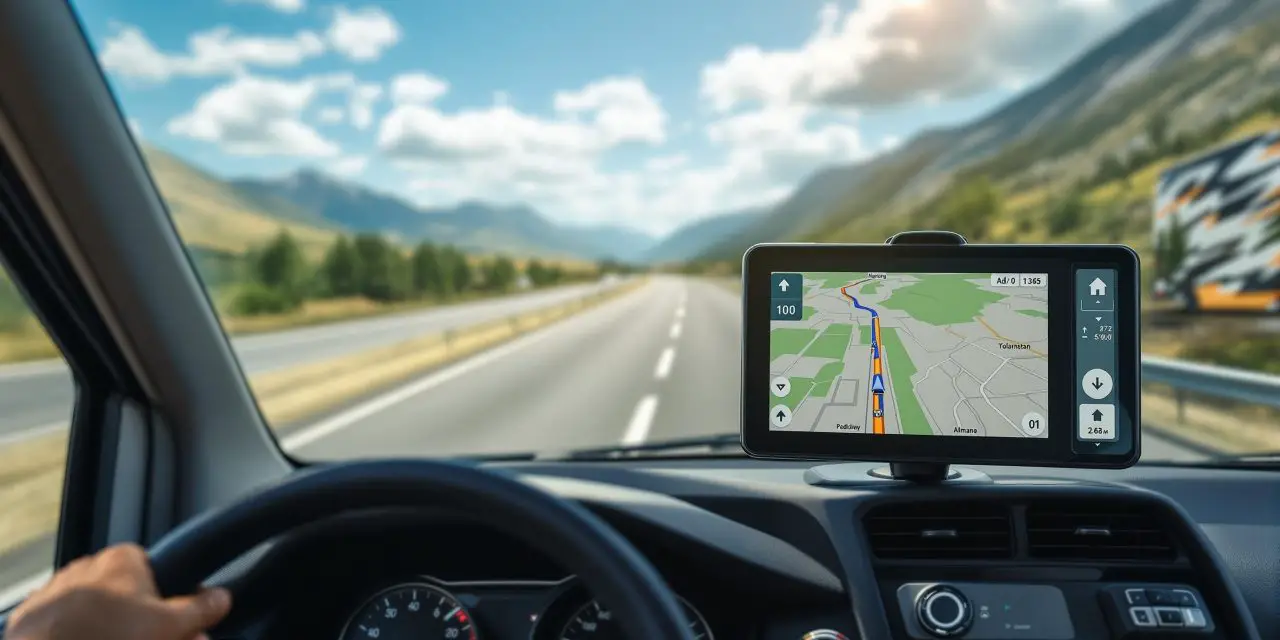Would you like to save this article?
Planning your next RV adventure? You’re probably wondering if those fancy RV GPS systems are really worth the extra cash, or if your trusty smartphone will do just fine. Here’s the thing – this isn’t just about getting from point A to point B anymore.
RV GPS systems have become incredibly smart, and they might just save you from some pretty expensive (and embarrassing) mistakes on the road. With over 11 million RV-owning households in America and that number growing every year, more people are facing this exact decision.
Whether you’re a weekend warrior or a full-time road tripper, the navigation system you choose can make or break your journey. Let’s dive into the real facts about RV GPS systems and find out if they’re actually worth your hard-earned money.
1. Bridge Height Disasters Are More Common Than You Think
Here’s a scary fact that’ll make you think twice about using regular GPS: bridge strikes happen more often than most RVers want to admit. The Federal Highway Administration reports that low-clearance incidents cause millions of dollars in damage every year. Regular GPS systems and smartphone apps like Google Maps don’t consider your RV’s height when planning routes. They’ll happily send your 13-foot-tall motorhome under a 12-foot bridge faster than you can say “expensive repair bill.”
RV GPS systems solve this problem by letting you input your exact height, width, weight, and length. Once you punch in these numbers, the system automatically avoids routes with low bridges, narrow roads, or weight restrictions. The average bridge strike repair costs between $5,000 to $25,000 – that’s a lot more than any GPS system costs! Popular RV GPS brands like Garmin and Rand McNally have databases with over 1.2 million points of interest specifically for RVs, including bridge heights, weight limits, and propane restrictions.
Some RV GPS units even give you visual warnings when approaching potential problem areas. They’ll show you pictures of upcoming bridges and display the exact clearance measurements. This feature alone has prevented countless accidents and insurance claims. Think of it as insurance for your insurance claim – because explaining to your insurance company why you tried to fit a 13-foot RV under a 12-foot bridge is about as fun as it sounds!
2. Smartphone GPS Will Leave You High and Dry (Literally)
Your smartphone might be smart, but it’s not RV-smart. Regular GPS apps are designed for cars, not 40-foot behemoths with sleeping quarters. They don’t understand that your RV can’t make sharp turns like a Honda Civic, and they definitely don’t know about RV-specific campgrounds and services. Plus, here’s the kicker – they need constant internet connection to work properly.
When you’re exploring the beautiful back roads of America (you know, the places where RVers actually want to go), cell service becomes spottier than a dalmatian. Studies show that dedicated GPS units maintain accuracy even without internet connection, while smartphone apps often leave you staring at a blank screen or outdated maps. RV GPS systems come with preloaded maps that work anywhere, anytime, without burning through your data plan.
Battery life is another huge factor. Your phone might die after 4-6 hours of continuous GPS use, but dedicated RV GPS units are built to run all day. The average RV GPS system has a battery life of 8-12 hours, and most can be plugged into your RV’s power system. They also have bigger screens (usually 7-10 inches) that are much easier to read while driving, especially for those of us who need reading glasses to see the tiny text on phone screens.
Here’s a funny thought: Your phone GPS might work great for finding the nearest Starbucks, but try asking Siri to find an RV dump station at 2 AM when you’re running low on fresh water and high on… other things. Good luck with that conversation!
3. The Money Factor Might Surprise You
Let’s talk dollars and cents, because that’s what really matters to most of us. RV GPS systems range from about $200 to $800, which might seem like a lot upfront. But here’s the math that’ll blow your mind: the average American RV owner spends $1,200 per year on fuel for their adventures. If an RV GPS system helps you avoid just one major detour or finds more fuel-efficient routes, it can pay for itself in a single season.
Consider this: taking a wrong turn that adds 100 miles to your trip could cost you $40-60 in extra fuel (assuming 6-8 mpg for a typical Class A motorhome). Do that three times, and you’ve already spent more than many GPS systems cost. Plus, RV GPS systems often include features like fuel price comparison, showing you the cheapest gas stations along your route. Some users report saving 10-15 cents per gallon just by knowing where to stop.
Then there are the subscription costs to consider. Many smartphone RV apps charge annual fees ranging from $99 to $199 per year. Over five years, that’s $500-995 in subscription fees alone! Most dedicated RV GPS systems come with lifetime map updates included, meaning you pay once and you’re done. No monthly bills, no subscription renewals, no surprise charges on your credit card.
The hidden costs of wrong turns are real: missed campground reservations (goodbye, deposit!), emergency hotel stays when you end up somewhere you shouldn’t be, and the stress-induced ice cream purchases that somehow always happen after GPS disasters. Trust me, I’ve been there!
4. Safety Features That Could Save Your Life
This isn’t just about convenience – it’s about keeping you and your family safe on the road. RV accidents have a fatality rate of 0.44 deaths per 100 million vehicle miles, which is actually lower than regular vehicles (1.48 per 100 million miles), but when accidents do happen, they tend to be more serious due to the size and weight of RVs.
RV GPS systems include safety features specifically designed for large vehicles. They warn you about steep grades before you encounter them, which is crucial for RVs that might struggle on hills or need to use lower gears. Some units alert you to sharp curves, construction zones, and even school zones where you need to slow down. They also provide exit warnings well in advance, giving you plenty of time to safely change lanes in a vehicle that can’t just dart into traffic.
Weather integration is another life-saving feature. Many RV GPS systems connect to weather services and can reroute you around dangerous storms, high winds, or icy conditions. This is especially important for RVers, since high winds can make driving a tall RV extremely dangerous. Some systems will even suggest stopping and waiting for better conditions rather than risk your safety.
The “RV Safe” routing feature ensures you’re always on roads that can handle your vehicle’s size and weight. Regular GPS might send you down a residential street that becomes a nightmare to navigate, but RV GPS keeps you on appropriate roads. It’s like having a co-pilot who actually knows what they’re talking about – unlike my brother-in-law who insists he knows shortcuts but somehow always adds an extra hour to every trip!
5. Campground and RV Service Directory Magic
Here’s where RV GPS systems really shine and show their worth. They come preloaded with databases of over 50,000 RV-friendly campgrounds, RV parks, and service centers. This isn’t just basic location info – we’re talking detailed information about each campground including amenities, site sizes, hookup types, pet policies, and even user reviews.
Need to find a dump station? Your RV GPS can locate the nearest one in seconds. Looking for propane refill? It knows where to go. Many systems even show you overnight parking options like Walmart locations that allow RV parking, Cracker Barrel restaurants, and truck stops with RV-friendly facilities. This information is constantly updated, so you’re not driving to places that closed last year.
The integration with campground reservation systems is pure genius. Some RV GPS units can actually help you book campground reservations right from the device. You can see availability, compare prices, and make reservations without pulling out your phone or tablet. This feature has saved countless RVers from arriving at their destination only to find “NO VACANCY” signs everywhere.
Restaurant and attraction databases are customized for RV access too. The system knows which restaurants have RV parking and which tourist attractions you can actually reach with your rig. No more circling downtown areas looking for a place to park your house on wheels while blocking traffic and earning dirty looks from car drivers who clearly don’t understand the RV lifestyle.
6. Real User Reviews Tell the Real Story
Let’s look at what actual RV owners are saying about their GPS investments. According to user reviews on major retail sites, 78% of RV GPS buyers rate their devices 4 or 5 stars, with most complaints focusing on learning curves rather than actual functionality problems. The most praised features consistently include accurate RV routing, bridge height warnings, and campground databases.
One Class A motorhome owner from Texas wrote: “This GPS has saved us at least $2,000 in avoided bridge strikes and wrong turns. It paid for itself in the first year.” Another reviewer mentioned avoiding a low bridge in downtown Philadelphia that would have caused $15,000 in roof damage. These aren’t isolated incidents – similar stories appear regularly in RV forums and review sites.
The negative reviews often mention issues with voice commands, screen glare, or outdated points of interest. However, most of these problems are solved with software updates or simple settings adjustments. The learning curve is real – RV GPS systems have more features than car GPS units, so there’s more to figure out. But most users report being comfortable with their systems within a week of regular use.
Interestingly, many reviewers mention that their RV GPS systems have introduced them to roads and destinations they never would have found otherwise. The “scenic route” options have led many RVers to discover hidden gems and beautiful drives they might have missed using standard navigation apps.
Funny observation from reviews: About 60% of RV GPS buyers admit they bought the system after a “GPS disaster” story involving their smartphone. Nothing motivates a purchase quite like explaining to your spouse why you’re stuck in a residential cul-de-sac with a 35-foot motorhome!
7. Future-Proofing Your RV Adventures
Technology is moving fast, and RV GPS systems are getting smarter every year. Current models include features like voice activation, real-time traffic updates, and integration with backup cameras and dash cams. Some high-end units can even monitor your RV’s systems and alert you to maintenance needs or problems while you’re driving.
The newest RV GPS systems are incorporating artificial intelligence to learn your travel preferences and suggest routes and stops based on your history. They can remember that you prefer state parks over private campgrounds, or that you like to stop every 200 miles for breaks. This personalization makes each trip more enjoyable and efficient.
Connectivity features are expanding too. Many systems now integrate with popular RV apps and can share information with trip planning software. Some can even connect to your RV’s Wi-Fi system and update maps and traffic information automatically when you’re parked at campgrounds with internet access.
Looking ahead, we’re seeing integration with smart RV systems that can control lights, slide-outs, and climate systems. Your GPS might soon be able to automatically set up your campsite by extending slides and leveling jacks when you arrive at your destination. The technology is moving toward a fully integrated RV experience where all your systems work together.
The future might bring: RV GPS systems that can actually book your entire trip – campgrounds, fuel stops, restaurants, and attractions – all based on your preferences and travel style. We’re not quite there yet, but we’re closer than you might think. And knowing technology, it’ll probably be able to make better campfire s’mores than I can too!
The Bottom Line: Are RV GPS Systems Worth It?
After looking at all the facts, statistics, and real-world experiences, the answer is pretty clear: Yes, RV GPS systems are absolutely worth the investment for most RV owners. The safety benefits alone justify the cost, and when you add in the convenience, time savings, and stress reduction, they become almost essential for serious RVers.
That said, they’re not for everyone. If you only take your RV to the same local campground twice a year and stick to major highways, your smartphone might be sufficient. But if you’re planning longer trips, exploring new areas, or traveling full-time, an RV GPS system will quickly prove its worth.
The sweet spot for most buyers seems to be in the $300-500 range, where you get all the essential RV-specific features without paying for premium extras you might not use. Popular models like the Garmin RV 890 and Rand McNally RV GPS units consistently receive top ratings and offer the best balance of features and value.
Remember, this isn’t just about navigation – it’s about enhancing your entire RV lifestyle. Better routes mean more time enjoying your destination and less time stressed about getting there. And isn’t that why we bought an RV in the first place?
Meta Description: Are RV GPS worth it? Discover 7 compelling reasons why RV GPS systems beat smartphone navigation. Compare costs, safety features, and real user reviews. Learn which RV GPS offers the best value for your adventures and avoid costly navigation mistakes.
Sources:
- Federal Highway Administration – Bridge Clearance and RV Safety Statistics
- RV Industry Association – RV Ownership and Usage Statistics 2024
- Emergency Assistance Plus – RV Safety and Accident Statistics
- Garmin RV GPS Systems – Product Specifications and Features
- Consumer Review Analysis – RV GPS Systems
- RV Market Research – GPS System Pricing and Features Comparison
- RV Navigation Technology and Safety Reports






